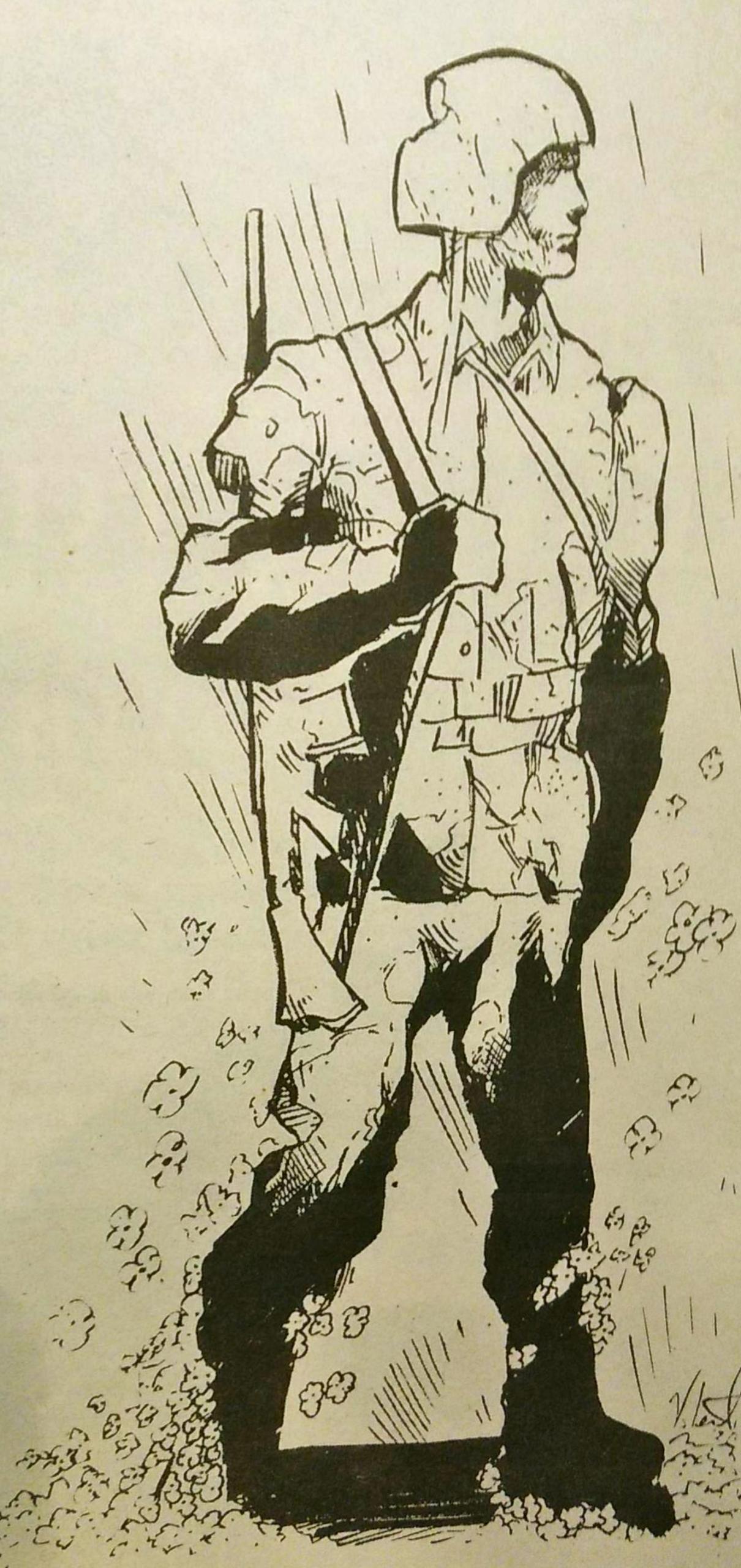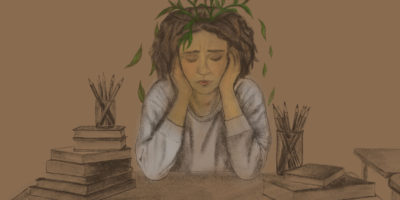By Jennifer Kwan
Every year on Jan. 9, Ryerson student Sonia Kuczaj celebrates her birthday the same way. Ten to 15 relatives fill her house and they spend the afternoon chatting over lunch. Kuczaj, 26, and her 20-year-old sister, Monika, help their mother prepare the meal, which usually begins with a slice of quiche and a bowl of borscht, followed by a meat dish and potatoes.
As the two sisters ready their house for the guests, they often joke about their grandparents. That’s because when Kuczaj hears her 80-year-old grandfather, Jan, come through the front door, she says to herself: “Oh boy, it’s going to be a long afternoon.”
It begins with the usual small talk. “How are you? How is school? Do you have a boyfriend?” But when it’s time for coffee and dessert, he starts sharing, as he does every year, stories of his time as a commander of the Raba Wyzna Polish underground resistance during the Second World War. He tells her about sleeping in bunkers, and about stealing uniforms from German soldiers. Even though she’s heard these stories before, she sits beside him and listens, knowing that he wants her to remember them and learn their lessons.
For Kuczaj and most other young Canadians these stories are generally recounted around Remembrance Day, and even then they don’t strike a significant chord.
Remembrance Day has been celebrated in Canada since 1921. For weeks leading up to Nov. 11, poppies are seen virtually everywhere, as are the Royal Canadian Legion members who hand out the velvety flowers on street corners and outside malls. The day commemorated the sacrifices of 66,655 Canadians who gave their lives to fight in the First World War. It also honours the 44,893 lost in the Second World War, and the 516 who perished in the Korean War of 1950 to 1953.
Yet, for most people, wearing a poppy is something you just do. War is what you read about in textbooks or skim through in newspapers. It invokes tales of distant lands and times, holding little meaning for our younger generations.
Some young people, however, have a different relationship with war. They’ve come here from war-torn regions with experiences that are vivid and often painful to remember. Like those who participated in the battles of earlier decades, war has touched these new Canadians and changed their outlook on life. For them, there is no generation gap, and with their stories, along with the voice of the past, they’re trying to change the way their peers relate to war.
At 93 years of age, Sam Hambly is among the oldest voices still telling stories of the war. Hambly served as a captain with the British Army’s 11th Armoured Division in Louvain, Belgium. He was on of 673 Canadian officers loaned to the British Army near the end of the Second World War because in 1943, the army didn’t have enough junior officers.
“I got a first-hand knowledge of what war means and why it is so necessary to work for peace,” Hambly said from his tiny room in Central Park Lodge in Toronto’s west end. “Nations must cooperate and we can by setting an example with people we’re working with from day-to-day.”
In the five decades since the war, Hambly has been devoted to environmental conservation. In 1992, he won the Lieutenant-Governor’s conservation award, and was honoured twice for his work by the Recycling Council of Ontario Waste Minimization.
Hambly rarely talks to his children or grandchildren about the war because he says he’d rather talk about the environment. But, his son, Peter, a Superior Court judge in Kitchener, Ont., says his father’s obsession with the environment gave the family a sense of what the war was like for him. “In the trenches of the war is where this is rooted,” Peter said. “He believes he was spared in order that he could come home to promote conservation for the world.”
While most young Canadians have a hard time relating to war, 27-year-old Mihane Sadikobic and 22-year-old Sajjad Wasti are familiar with its consequences. Sitting outside the Second Cup at Dundas and Victoria streets, Sadikobic sips on her cappuccino, exhales a cloud of Marlboro smoke and says, “Back home, I would sit like this at a cafe and over there at another cafe there would be a bombing.”
Living so close to war has made Sadikobic realize how important it is for nations to work for peace. The first-year information technology management student is one of 900,000 Kosovar Albanian refugees forced to leave Kosovo between March and June of 1999. The conflict in Kosovo, which began when Slobodan Milosevic refused to sign a peace deal that would have given Kosovo the autonomy it had before he rose to power in 1989, drew the attention of the world.
Two days before the start of NATO bombings on March 24, Sadikobic left for Macedonia with family and friends. She thought they would be gone for just two or three days. They spent almost three months there.
“I could never imagine in my weirdest dreams this would happen,” Sadikobic said. “I always felt the country I was living in was pretty safe. When it happens you think, ‘Okay, this is it.’ I thought I was going to die. It is a war. There are no rules in war.”
The Serbs withdrew from Kosovo in July, 1999, and although Sadikobic says she felt the region was “safe again,” the experience has changed her. “It was like I didn’t sleep for one year.”
Since arriving in Canada this fall, Sadikobic has been sleeping better. She says young people approach her with questions about Kosovo, and while she thinks they should be aware of what’s happening in the world, when it comes to war, she says people shouldn’t let it consume them.
“When you think back it’s worse,” Sadikobic said. “Imagine if something bad happened to you. You don’t want to think about it all day and night. When you go to the real world where theory and practice miss each other, nothing here [in Canada] is hard.
“I didn’t bring my war here.”
Last month, Milosevic conceded electoral defeat to Vojislav Kostunica and stepped down as Yugoslav President after a pro-democracy uprising.
Unlike Sadikobic , 22-year-old business student Watsi believes his peers should be more passionate about war. For him, life in the United Arab Emirates during the 1991 Persian Gulf War still feels real. “You don’t have to be in war to feel its full effect. The emotions get passed onto you,” said Watsi, who came to Canada a year and a half ago.
He caught wind of the growing tensions in the Middle East when he was vacationing with his mother and sister in Karachi, Pakistan in August, 1990, while his father was working in the oil fields of the United Arab Emirates. “It was a joke, totally unbelievable, Kuwait of all places. Kuwait was so safe, so rich, so secure. Getting a job in Kuwait was like hitting a gold mine.”
Although Wasti thought he and his family wouldn’t return to the UAE because of the political instability in the region, they did at the end of the summer. The reality of the Gulf war became a part of daily life. “I was impressed with what was going on — the terminology, the show of force, the American troops. [When] war broke out, my house was like a news-monitoring cell.”
Wasti only recently learned about Remembrance Day. He feels we need to move beyond just one day of remembering. “In essence, it’s a diversion from what’s actually happening in the world now. It has happened before and it can happen again. It shouldn’t be a distant memory.”
Dave Gordon, assistant provincial secretary of the Royal Canadian Legion’s Ontario Command, says members could be doing more to encourage remembrance. “We as a legion are probably at fault. We probably take advantage of the fact that people know what Nov. 11 is all about. We have to ensure that people don’t forget.”
Sometimes Sonia Kuczaj forgets. But every year on Remembrance Day she phones her grandparents, and as much as it frustrates her to think that her grandpa still hasn’t “left the war,” she’s thankful he tells his stories. “I never saw Saving Private Ryan. Listening to my grandpa [is] just as vivid.”










Leave a Reply